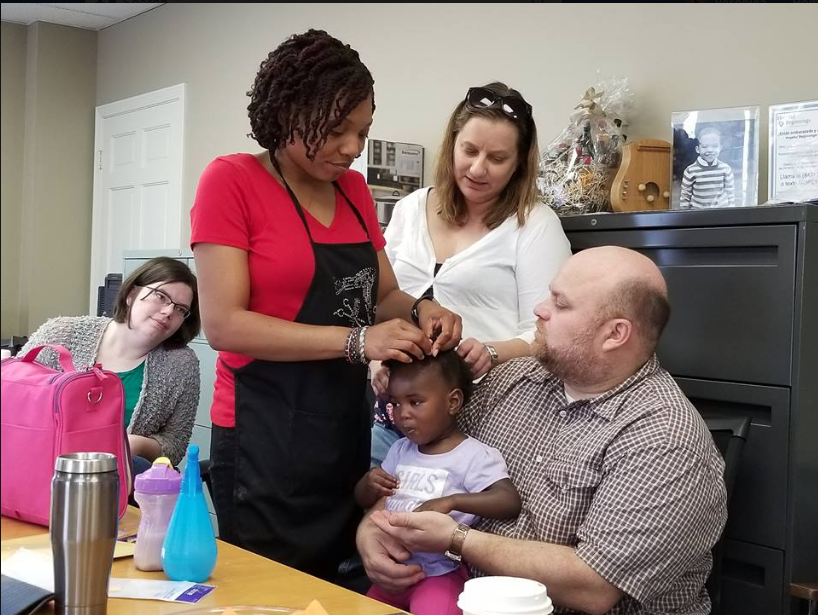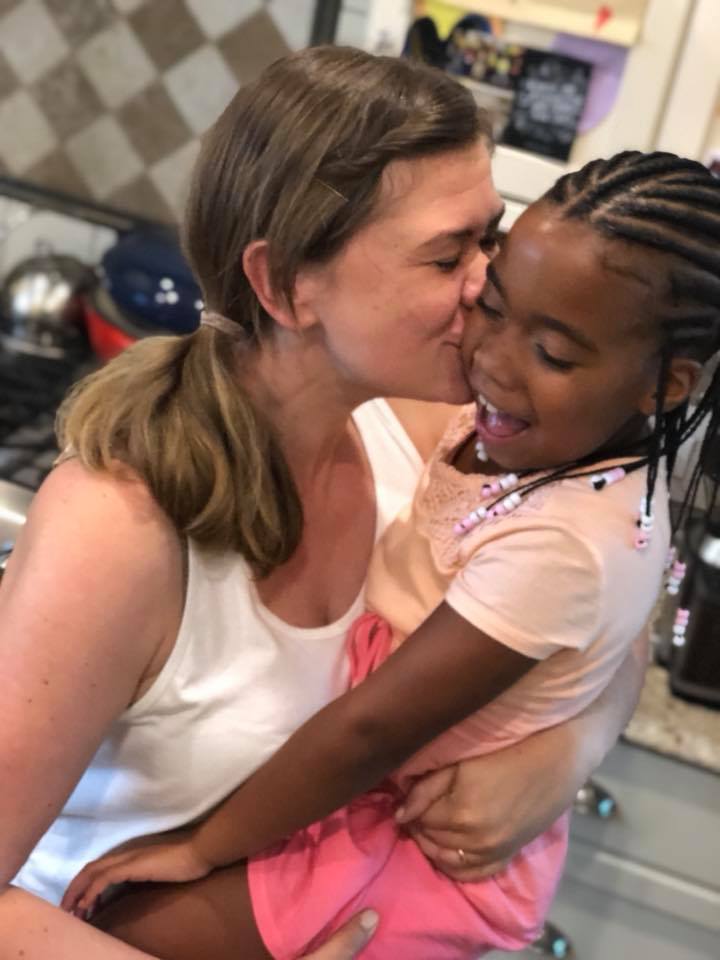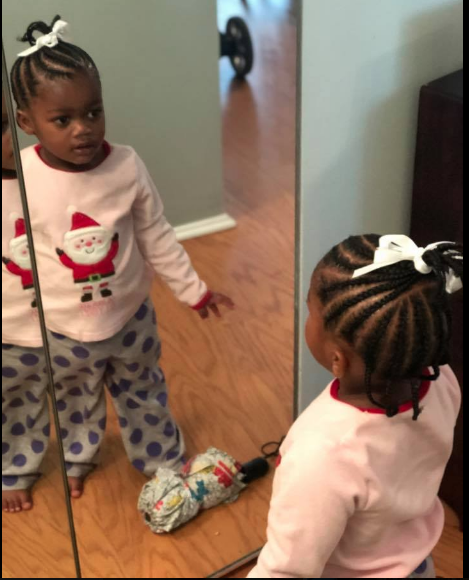
Source: Photos With Permission from Styles 4 Kidz / Styles 4 Kidz
Last week, I stumbled upon a 60-second documentary featuring Tamekia Swint and her business Styles 4 Kidz. This salon specializes in styling hair for children in transracial adoptive families. For Swint’s work, this means these are Black children who were adopted by non-Black, often White, people. This is not how she started her business though. Styles 4 Kidz was a salon dedicated to styling natural, Black hair.
But eight years ago, Swint learned that there was another community that was in need of her skills. Today, operating in Oak Park, Illinois, a suburb of Chicago, Swint spoke to us about the evolution of her business, racial tensions, prioritizing Black children and how she rationalizing teaching White people about the sacred and historical Black hair traditions. See what she had to say below.
MN: Was Styles 4 Kidz started to serve trans racial adoptive families or was it a regular salon for children?
Tamekia Swint: I started as a regular hair care business for children, first out of my desire to serve children through their hair.
What happened to let you know that there was a need for the type of services you offer now?
Well, I ran into an African American mom that I was actually trying to market my services to. And she expressed to me that there was someone she worked with who definitely needed help. And she wasn’t a stylist so she wasn’t able to help her. So she said, ‘I’m going to pass her information along to you and maybe you can help her.’ When the lady called me, I had no idea that there was a community of people out there that needed help in that way.
We are in the heart of one of the most diverse communities in Chicago, where a lot of the transracial adoptive and foster families live.
As a part of your services, do you teach the mothers how to do their child’s hair?
Yeah! There’s an educational portion and social portion when that’s needed. And we have some clients who want just a one on one lesson. It’s an instructional lesson that covers the hair care basics with their child. They’ll bring their child and we’ll discuss how you wash their hair, how you condition their hair, how you moisturize it, how often you should moisturize it. We talk about styles that will be conducive for age and texture. We give them quick styles that they can do on their own. Some parents don’t mind learning on their own and they don’t need us anymore.
Because of time or maybe because a parent wasn’t getting it, we felt like there was a need to offer services so that those families can feel like they had a place to come to to get the ongoing help that they need.

Source: Photos With Permission from Styles 4 Kidz / Styles 4 Kidz
How much of your business would you say consists of helping non-Black parents?
It’s the majority. And that’s only recently, within the last month, because of all the media attention that we’ve gotten. We’ve had some African American clients reach out to us but the majority of our client base are transracial adoptive and foster families. It’s a growing trend. And biracial children. Let me not leave them out. It’s a wide variety of hair. You have African children, biracial children, African American children and they need help with all. They’re not familiar with how to work with any of those textures.
There are some Black people who feel very strongly against White people adopting Black children. And we know that Black hair is very sacred and our traditions are historical, with deep meaning behind them. So there are some Black folk who aren’t necessarily comfortable with teaching our traditions to White people. Have you heard those types of criticisms?
Laughs. You know what? It’s something I struggled with a lot in the beginning. And what I started to realize is that this may be the only opportunity for the kids to be exposed to their culture. Because as I’m teaching the parent, I’m also teaching the child, right? So they would never know what’s being passed down to them.
Even now, I think about one of the older kids I served. He’s in college now. I locked his hair when he was 11 and they’re like really long and beautiful. And how proud he is of that. You can’t take that away from him, that he had that experience and being able to find his identity and a tie to his culture through his hair. I struggled a lot at the beginning but as I began to work with the kids, I realized, ‘You know what, this is important. They need to know!’ So it’s not just about the parents. There’s a culture piece for each and every workshop we teach and girl, it’s so funny, it’s so shocking to [non-Black parents]. They’re like, ‘Am I learning a cultural lesson right now?’ And I’m like, ‘Yes! And you have to listen to me because you came to a hair class.’ But if you’re going to adopt an African American child, you have to expose them to their culture, it’s important. It’s as important as making sure that their hair is done. So we build that into each class.
And like I said, I struggled as a natural hair stylist, but even when I think about the girls who are in the group house, whose parents will never teach them [how to take care of their hair] because they’re out in the streets, or they’re on drugs. They’re not even trying to be responsible enough to teach their kids about hair. So somebody has to do it. That being said, for me, I’m thinking about the kids.
One of the transracial adoptees reached out to me and I so appreciate what he said to me. He said, ‘I appreciate what you’re doing because he wrote a book, it’s called Growing Up White and it just talks about how hard it was for him being a Black man in the world because he was not exposed to his culture growing up.
There are so many other kids who don’t want anything to do with African Americans because of how they look. And it’s a shame. It’s really sad. So this is just one way I feel like I’m contributing. And I will say that, a lot of the parents that we work with, some of them want to know but a lot of them, they mostly want the services because it’s not easy, learning how to braid, how to twist and do the hair on a regular basis. It’s so much easier to bring them somewhere. A lot of them want to know what to do in between time, but some of them say it’ll make so much sense for me to bring them back here.
I think the service you’re providing really speaks to the African proverb, “It takes a village to raise a child.” Just because you don’t have a Black parent, you’re still a part of the Black community, you’re still a part of this village and there’s someone to look out for you.
Yes! I think about one of my [child] clients. She saw the movie 12 Years a Slave and it was her first exposure to slavery in this country.
Oh God!
It changed her whole life in the aspect that she really, fully understood where she came from. She was drawing all those connections and she had me to talk to about it. Her parents allowed her to express herself about how she felt about it. I could tell that after that, she felt more connected in a way that she had never felt connected before. And I feel like I was intimately involved in that because I encourage parents, ‘Let your kids see certain things. Expose them.’ I went off on one parent because their child didn’t know who Tyler Perry was. How do you not know who Tyler Perry is? So things like that, just drawing attention to those things that I think are important.
Even exposing them to other African Americans here, [the parents and the children.] That I think is more important, than our personal hangups.
You were mentioning the client with locs and how other Black children didn’t want to be involved with him. Can you speak to how hair for Black people helps a lot with social standing. If your hair is not together, it can be very difficult for you to be ingratiated within the Black community.
Absolutely and accepted by other Black kids at school. You already stick out like a sore thumb because your parents don’t look like mine but then your hair… And I feel like that’s the reason a lot of these families migrate to communities where there are no African Americans because of the judgment that’s being passed by other African Americans. So that is a huge issue that I think we need to work on because a lot of time they mean well. They’re not trying to harm their children and the reality is a lot of African American families are not adopting our kids.
I don’t even think we, in the community, even realize the transfer of wealth to our kids. It’s amazing the impact that they’re [the adoptive parents] having. But if we could be more supportive of the kids who are in these families, I think it could have a huge impact, even on our community. Instead of judgment, we need to become active participants. How can we help? How can we serve? How can we assist the children who need to be exposed to their culture?

Source: Photos With Permission from Styles 4 Kidz / Styles 4 Kidz
Now that you say that, it reminds me—there have been some Black children who have been adopted by White families and have been abused. And a lot of times those Black children were abused because they didn’t have anyone else to talk to. With your salon, if these kids have someone they trust, they’ll be more likely to share if something’s not right at home.
And we talk about that, even with staff. We talk about ways we can be helpful. Parents might not even be aware that they’re doing something they shouldn’t be doing. Because remember, they’ve only known the world from a White experience. They haven’t seen it from a Black experience. And one of my parents, he actually went and took a White Privilege class. He said, ‘I need to understand this.’ It’s so deeply embedded in our society that sometimes you don’t even have an awareness. Just being in a situation with another African American, they can draw your attention to something like that. ‘That’s not okay.’
There are so many things on both sides of the issue that have come up.
I even think about some of the biracial families that we serve and some of the racial tensions that are there. Someone was sharing it’s hard for her to develop relationships with African American women because she says they feel like, ‘Well, you took one of our men.’ So many issues.
How did that conversation go?
I think she was just venting and just sharing how grateful she was to walk into a salon and not feel judged. Because as African American women, some of us, we’re very angry, especially when we’ve been single for a long time or we’re out there looking. So it was a situation where she needed to say that she was happy that she didn’t feel judged. And it was a good thing because both of her daughter’s hair—both of them—it was matted so bad. It had been like that for weeks.
She had no idea what she was doing…
She had no idea. So she was relieved we weren’t judging her for her kids’ hair being like that. She said it happened once before at another salon she went to and she said the lady was going off on her. Like, ‘This is just a shame!’ But she didn’t understand, this is just a part of African American culture. That’s how we are. We do that with one another. ‘Girl, what’s wrong with you?!’
There’s an accountability among us, for real.
It is.
Black hair is not easy, even for Black people, so do you find that you have Black mothers who are taking your classes or are trying to learn?
Yes! We will have to build that out for them because right now a lot of the classes include a lot of culture lessons that we give the White parents.
It’s so funny, I just finished a series on How to Raise Pro-Black kids and a lot of times, we think about that in the context of Black parents. But you need to raise pro-Black kids as White people too?
Yes, you do! It’s even more so important. And that’s what we teach in our workshops, life skills. You gotta focus on life skills. They’re not going to be in a White world forever.
They’re not even in the White world now…
They’re not, even though that’s the reality [the parents] think they’re living in.
If you would like to donate to support Styles 4 Kidz that enable us to continue our services, the cultural workshops for non-Black parents and serving the children in group and foster homes, you can do so, here.
You can watch Tamekia at work in the video below.









